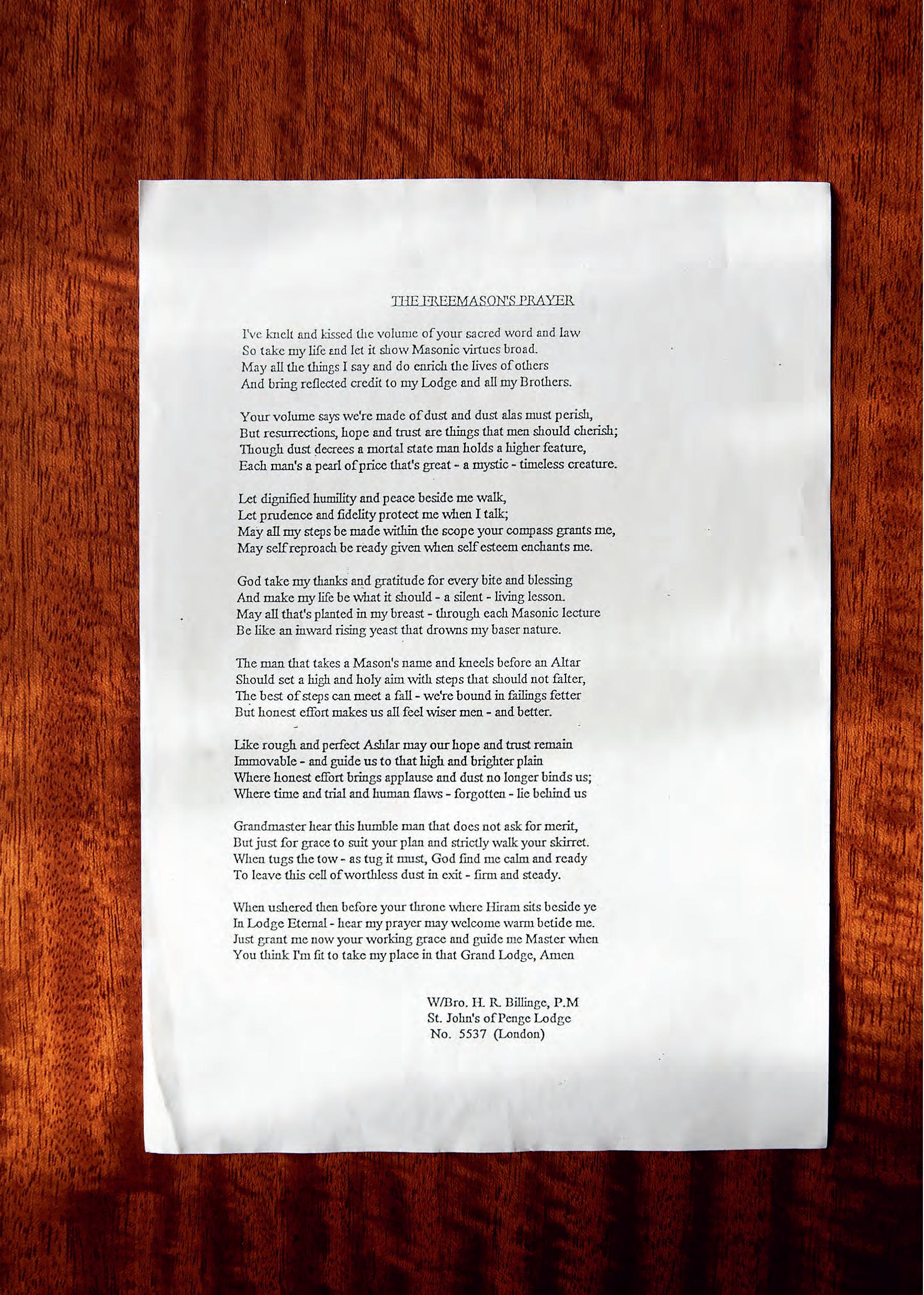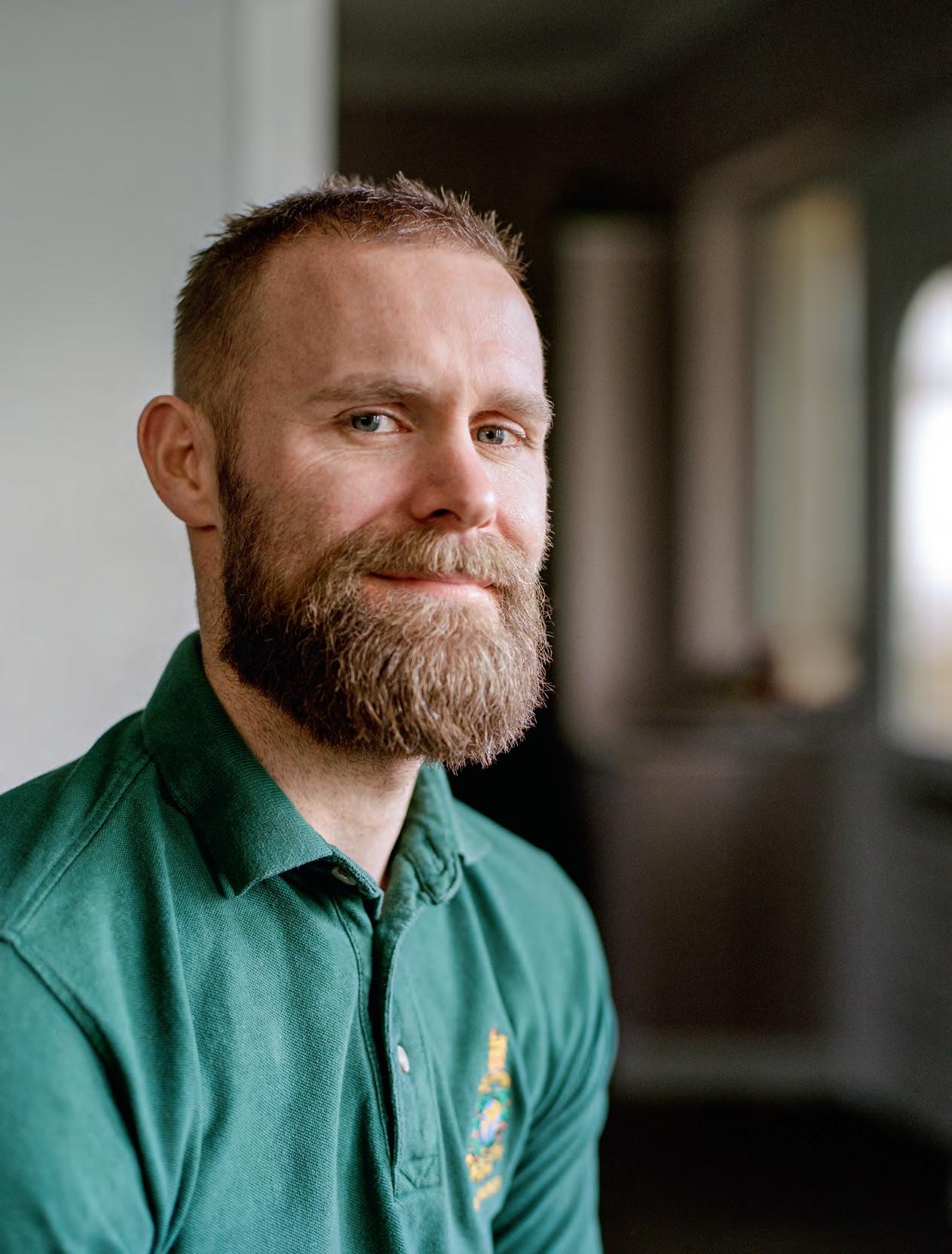
9 minute read
Bravery and brotherhood
Stories
People, places, history and more
Written by D-Day veteran Harry Billinge MBE, P18
Royal Marine Mark Ormrod was awarded the MBE in 2020
FORCES FOR GOOD

Despite being separated by six decades, military Freemasons Harry Billinge and Mark Ormrod are united in Brotherhood
WORDS PETER WATTS PORTRAITS JOONEY WOODWARD
In March 2020, two men of different generations but similar experiences were awarded the MBE. Both were military veterans who had suffered unbelievable trauma during warfare – Harry Billinge on
D-Day in 1944, Mark Ormrod in Helmand in 2007. They spent the following years devoting time and energy to other people and taking part in charitable endeavours.
Both are also Freemasons. We talked to Harry and Mark about their military careers, their charity work and the importance of Freemasonry to their lives.
HARRY BILLINGE MBE, 95 It’s almost 77 years since Harry Billinge landed on Gold Beach at dawn on 6 June 1944. But even with the distance of seven decades, he’s liable to break down in tears when he thinks about what he witnessed on D-Day.
Harry had followed his father and brothers into the army in 1939, turning down the chance to be an enlisted officer and instead serving as a sapper in the Royal Engineers. He was just 18 on D-Day, when he became one of four in his unit to survive the landing and subsequent battles in France. He waves away any attempt to describe him as a hero, offering only stark thoughts on the horror of battle.
‘There are no words to describe that terrible day,’ he says. ‘22,442 British men died in Normandy, and it made a terrible impression on me. The sea on D-Day was red with human blood. It still brings tears to my eyes.’
Although Harry is now 95, he still spends every day striving to ensure the fallen will never be forgotten. His energy is focused on raising funds for the British Normandy Memorial that will be located in a field overlooking Gold Beach. Etched on the stone will be the name of every individual who died serving in a British unit during the Battle Of Normandy.

Joining Mark on the 2020 honours list, D-Day veteran Harry Billinge MBE
Since 2018, he has been a regular presence on his local high street in St Austell, Cornwall, collecting funds and creating awareness for the memorial. He has raised more than £25,000 and displayed a dedication that has inspired other fundraisers – dubbed Harry’s Army in honour of their relentless figurehead.
Harry arrived in Cornwall having struggled in London following his discharge from the army. He couldn’t sleep at night, and instead, would walk the streets of Petts Wood and Chislehurst. ‘It was still haunting me,’ he says. ‘They call it battle fatigue. My country taught me how to kill people and when you’ve done that, you have to live with it.’
He found some peace in Cornwall. There he opened a hairdressers, working with his scissors until he retired at 83. He also performed as a licensed reader in the Anglican Church, preaching in 44 different churches, including up to five each Sunday.
Harry has been an active Freemason for decades, having followed his father into the Craft. His father was initiated into a lodge in Pune, India, where he was posted after World War I, but later became a member of St John’s of Penge, No. 5537. Harry joined the same lodge in 1964. He served as Master and is also a Past Master of Lodge of Fortitude, No. 131 and Plym Lodge, No. 3821 in the south west.
‘Freemasonry and the army both need discipline,’ says Harry. ‘ I always do what I can with all my might, I don’t take anything out – I put a lot in. That’s what a Freemason should do.’
His charitable work has included raising money for the Royal British Legion, selling poppies for more than 60 years. In 2020, his efforts were recognised by Great Western Railway, which named a train after him, an honour to go alongside his MBE, Légion d’honneur and dozens of other medals.
‘I went to Penzance to see the train named after me. That was another lark. I’ve met Prince Charles at St Austell, we spent a long time at the rugby club having a cup of tea and chatting. When I got my MBE it was lovely to meet the Queen.’

During his lifetime, Harry has earned many medals, including the Légion d’honneur

COVID-19 might have slowed Harry’s activities, but he’s continued to raise funds for the British Normandy Memorial whenever possible. Those unthinkable experiences on the beach at D-Day have defined his life.
‘What I remember is the lovely men, all loving one another,’ he reflects. ‘Normandy veterans loved one another beyond the love of women. If you laid in a hole with a bloke being bombed and shelled and shot at, you became part of him and he became part of you. You know that bloke, you know his soul, and if you know that bloke, you have to love him.
‘When I was in the church, I conducted many funerals for Normandy veterans and Freemasons. I have done my best at everything I do and I still collect money for these people whenever I can.’ www.normandymemorialtrust.org/ harrys-army/
MARK ORMROD MBE, 37 Mark Ormrod’s life changed forever on Christmas Eve 2007. The Royal Marine was serving in Helmand, Afghanistan when he triggered an improvised explosive device. In the explosion, he lost an arm and both legs, and only stayed alive thanks to the skill of the medical response team. He was the first British serviceman to survive a triple amputation in Afghanistan.
The doctors told Mark he would never walk again, but he was determined to defy medical opinion, and did so six months after sustaining his injuries when he walked across the parade ground to collect his operational medal. Since then, he hasn’t stopped, using his experiences not to hold him back but spur him on to ever greater achievements. He’s been a motivational speaker, written a book, won 11 medals in two Invictus Games, carried the torch at the 2012 Olympics, raised thousands of pounds for charity and been an active Freemason. So what has been his greatest accomplishment?
‘It’s hard to find a single thing as it’s all part of my personal journey,’ he says. ‘I am constantly striving to improve myself and help other people along the way. As a result of that, a lot of cool things have happened.
FMT took all COVID-19 social distancing, PPE and safety precautions for these shoots

‘However, in March 2020, I was very fortunate as I was awarded an MBE, which feels like the icing on the cake for all the other things that have happened along the way. It’s like a culmination, although it’s exciting to think that there is so much more to come.’
This includes plans to publish a second book, write a children’s title, get his black belt in Brazilian jiu-jitsu and raise money for communities devastated by COVID-19. Much of 2021 will be occupied by the film being made about his life. Mark is assistant director and will be on set throughout; he isn’t worried about suffering flashbacks during some of the bloodier scenes.
‘I’m there to help to guide filming and make sure it’s accurate,’ he says. ‘I will probably end up asking for more blood and more screaming. I’ve spent eight years as a speaker travelling around the world telling my story, so I have seen all the graphic slides of me chopped up in a tent in Afghanistan. It doesn’t bother me now.’
One thing that got Mark through those first few months was Freemasonry. He believed this would replace some of the camaraderie he would no longer get from the military. His interest in Freemasonry started before he was deployed to Afghanistan, when he was approached by a relative who suggested he become a Freemason. Mark was sufficiently attracted by the principles to want to join the Royal Marine Lodge in his hometown of Plymouth. Then came the injury.
‘After what happened on Christmas Eve, I thought that would end my chance of joining the Freemasons because of the things that are required in initiation ceremonies,’ he says. ‘But the lads in the lodge were determined. They spoke to people higher up the Province and adapted the ceremony.
‘I did my first degree in a wheelchair, my second degree on a short set of prosthetics called stubbies, and my third degree on full-length prosthetics. I’ve since managed to progress to the Chair and held every office in the Craft. After my medical discharge, knowing that I was joining the Royal Marines Lodge was very comforting, but the more I’ve learnt about Freemasonry the more I realised it didn’t matter what lodge it was. All these people were similar to the people I was around in the military, which was one of the biggest reasons I didn’t want to leave.’
Mark remains connected to the military, working full-time for the Royal Marines Charity, and he intends to continue his Freemasonry adventure. ‘Every time you do that there are all those offices to go through again,’ he says. ‘And that means forcing yourself to grow, getting outside your comfort zone and moving forward as a person. I am a big advocate of personal development and that’s something the military and Freemasonry are good for.
‘I have been through moments in my life and around people where negativity can get into your head, but I am now into the idea of surrounding myself with good people. And that’s what Freemasonry does for me. It’s being around good people with similar interests, morals, ethics and values, and wanting to help make them even better people.’ FACTFILE: MILITARY FREEMASONS

Sergeant Johnson Beharry Born: 26 July 1979 Queensman Lodge, No. 2694. Awarded the Victoria Cross for saving members of his unit, Princess of Wales’s Royal Regiment, in Iraq in 2004. Pictured here at the unveiling of the Victoria Cross Remembrance Stone at UGLE in June 2019.
Horatio Herbert Kitchener, 1st Earl Kitchener of Khartoum and Broome 24 Jun 1850–5 Jun 1916. Secretary of State for War in 1914. He served as District Grand Master of Egypt and the Sudan, and of the Punjab in India.
John Jellicoe, 1st Earl Jellicoe 5 Dec 1859–20 Nov 1935 Admiral of the Fleet, he commanded the Grand Fleet at the Battle of Jutland in May 1916. He later served as First Sea Lord and as Governor-General of New Zealand, where he also served as Grand Master of the Grand Lodge.










